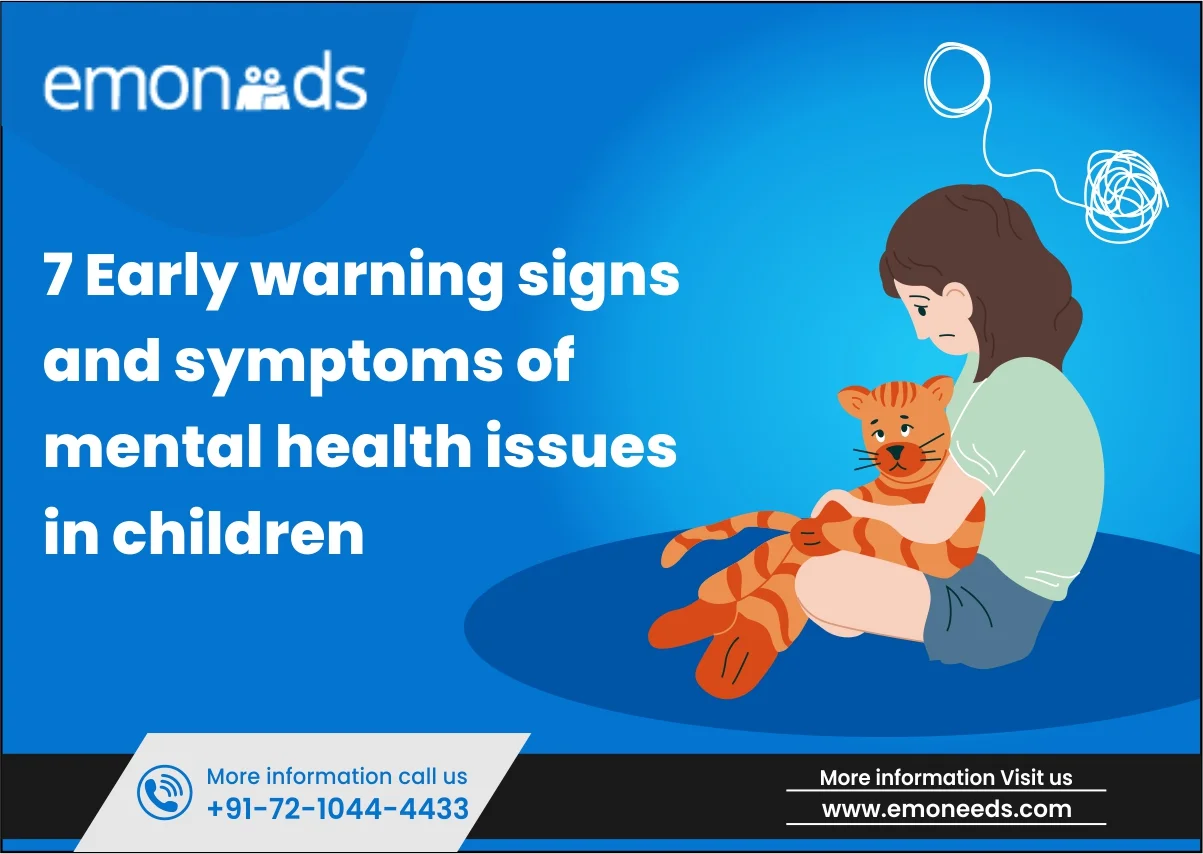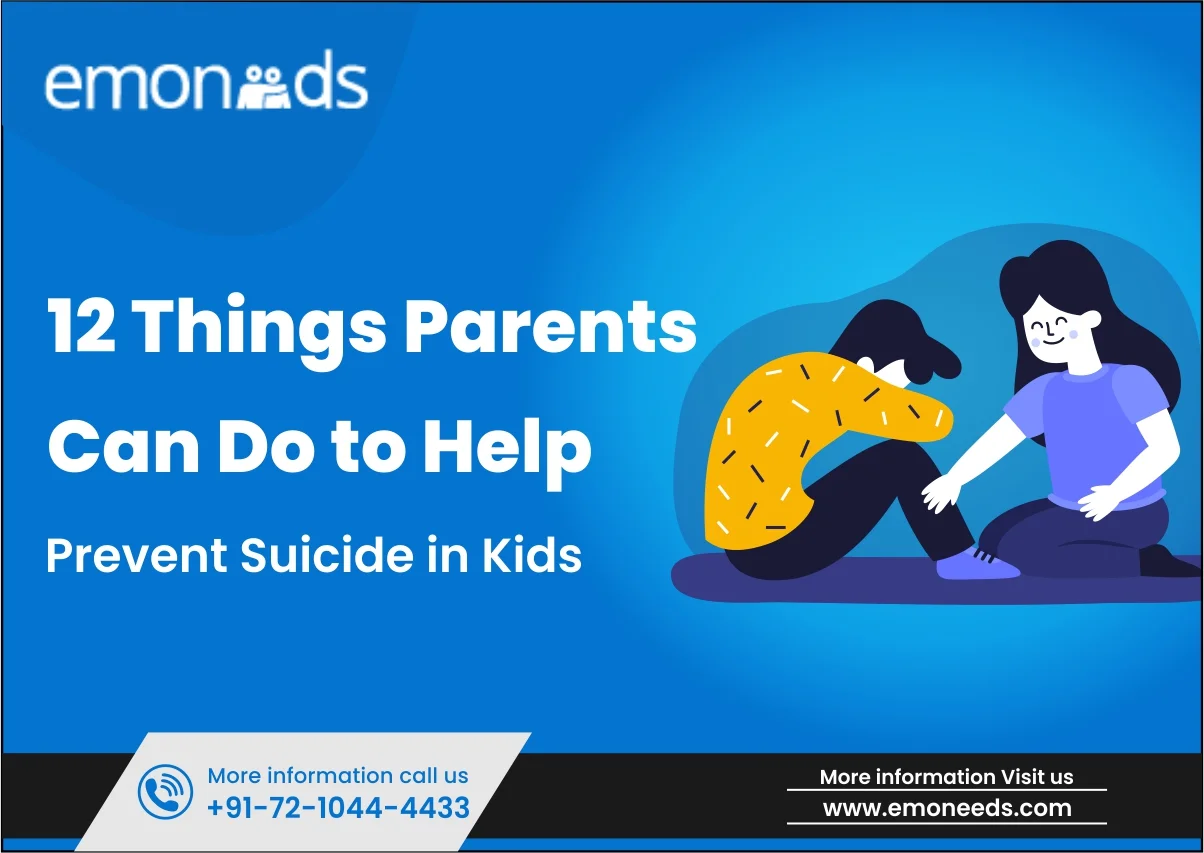
In the quiet corners of our homes and the bustling playgrounds of schools, children are experiencing a spectrum of emotions and challenges that often go unnoticed. The young mind is a delicate yet complex terrain, where early signs of mental health issues can manifest in subtle ways.
The world of children’s mental health has come a long way, but it remains a terrain marked by mystery and uncertainty. Many parents and caregivers grapple with identifying the early signs of mental health issues, often attributing them to typical phases of growing up. However, these early signs should not be dismissed, as they can serve as a crucial gateway to providing children with the support and assistance they need.
This blog aims to shed light on this crucial issue by discussing seven early warning signs and symptoms of mental health issues in children.
The Complex World of Children’s Mental Health
Understanding the mental health of children is not a straightforward task. The experiences and emotions of a child are unique and can vary greatly from one individual to another. This diversity makes it all the more challenging to identify when a child may be experiencing mental health issues. It is a field that is still evolving, as researchers and professionals continually strive to unravel the intricate tapestry of children’s emotional well-being.
One of the most significant challenges is that children often lack the vocabulary and understanding to express their feelings and thoughts fully. This can leave caregivers, parents, and teachers grappling in the dark, trying to discern the early warning signs that something might be amiss.
Recognizing the Signs
Identifying mental health issues in children can be challenging, as they might not always express their struggles directly. Moreover, many kids lack the emotional vocabulary to articulate their feelings adequately. That’s why it’s crucial for adults in their lives to recognize the subtle warning signs that may indicate underlying mental health issues. Here are seven early warning signs to look out for
1. Changes in Behavior
Children’s behavior can change for a multitude of reasons, but when these changes persist and seem unrelated to specific events, they might be a red flag for underlying mental health issues. Keep an eye out for sudden shifts in behavior, such as:
- Withdrawal from family and friends.
- Increased irritability or outbursts of anger.
- Regression to younger behaviors like bedwetting or thumb-sucking.
- A sudden decline in academic performance.
- Loss of interest in previously enjoyed activities.
These behavioral changes can signify that your child is experiencing emotional distress. While it’s essential not to jump to conclusions, it’s equally crucial to engage with your child in open and non-judgmental conversations to understand what might be causing these shifts.
2. Emotional Disturbances
Children are still learning how to manage their emotions, which makes mood swings and emotional instability somewhat common. However, if these emotional disturbances become severe or persist over an extended period, it’s a reason for concern. Look out for:
- Excessive worry or anxiety.
- Frequent bouts of sadness or depression.
- Unexplained panic attacks or phobias.
- Severe mood swings that disrupt daily life.
Emotional disturbances can vary in their manifestation, and children may exhibit a combination of these signs. It’s essential to pay attention to these changes and seek professional guidance when necessary to help children navigate their emotions effectively.
3. Social Withdrawal
Social interaction is a vital aspect of a child’s development, and social withdrawal can be an early sign of mental health issues. If your child is actively avoiding social situations or has trouble making friends, it might be indicative of a deeper issue. Signs of social withdrawal include:
- Preferring to spend time alone rather than with friends.
- A sudden loss of interest in social activities.
- Difficulty making or maintaining friendships.
- An unexplained fear of social situations, leading to avoidance.
Social withdrawal can be particularly troubling as it can perpetuate a cycle of isolation and loneliness. It’s crucial to provide support and encourage your child to engage with peers and loved ones.
4. Academic Struggles
Academic performance and mental health are closely linked. While it’s normal for a child’s grades to fluctuate, a persistent decline in academic performance can indicate an underlying problem. Keep an eye out for:
- A sudden drop in grades.
- A loss of interest in school or learning.
- Frequent school refusal or absenteeism.
- An inability to concentrate or complete assignments.
Remember, academic struggles can be both a sign and a cause of mental health issues. For example, a child suffering from depression may find it challenging to focus on schoolwork, which, in turn, leads to a decline in their academic performance.
5. Sleep Disturbances
The importance of sleep for a child’s development cannot be overstated. Sleep disturbances can be both a cause and a consequence of mental health issues. Watch for changes in your child’s sleep patterns, such as:
- Difficulty falling asleep or staying asleep.
- Frequent nightmares or night terrors.
- Excessive fatigue during the day.
- Sudden changes in sleep routines.
Sleep disturbances can have a significant impact on a child’s emotional well-being and cognitive functioning. Establishing healthy sleep habits is essential for promoting overall mental health.
6. Physical Symptoms
Children often struggle to express their emotions through words, so they might manifest their distress through physical symptoms. Be attentive to unexplained physical complaints, including:
- Frequent headaches or stomachaches.
- Muscle tension or unexplained aches and pains.
- Loss of appetite or overeating.
- Excessive fatigue or a lack of energy.
Physical symptoms can be a way for children to cope with emotional turmoil. It’s important to consider both the physical and emotional aspects of your child’s well-being when these symptoms arise.
7. Changes in Appetite and Eating Habits
Children’s eating habits can also provide valuable insights into their mental health. Changes in appetite or eating behaviors can be signs of distress. Look for:
- A sudden loss of appetite or refusal to eat.
- Emotional overeating or a preoccupation with food.
- An unhealthy obsession with body image and weight.
- The development of eating disorders like anorexia or bulimia.
These changes can be indicative of deeper emotional issues, and it’s crucial to address them with sensitivity and care. Early intervention is key to preventing these problems from escalating.
Conclusion
In conclusion, the mental health of children is a sensitive issue that demands attention and care. Recognizing early warning signs of mental health issues is paramount to a child’s well-being. Parents, caregivers, and educators have a vital role in providing support and fostering open communication.
If you suspect a child may be experiencing mental health issues, seeking professional help is recommended. Emoneeds is dedicated to addressing mental and emotional health needs, aiming to enhance performance, happiness, and quality of life. Our team of expert psychiatrists and clinical psychologists offers evidence-based, compassionate care, tailored to each individual’s requirements. We address a wide range of concerns, from anxiety and depression to major disorders, using the latest scientifically approved methods.
Reach out to Emoneeds for advanced emotional and mental health care. Don’t face these challenges alone; let us guide you towards a path of positive transformation, improved awareness, overall health, and enhanced relationships, both at home and at work. Emoneeds is committed to helping you become your best self.
